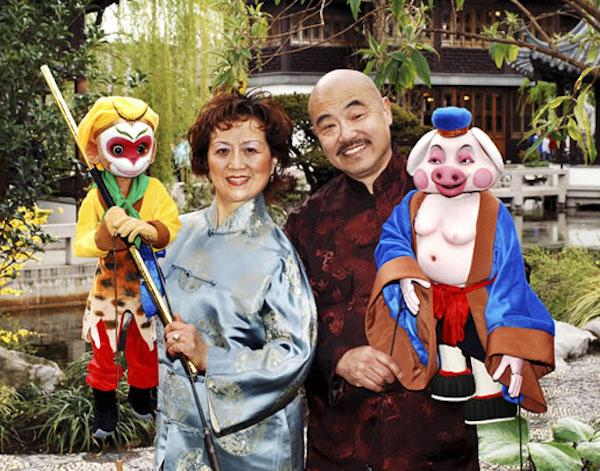Yuquin Wang and Zhengli Xu

Photo by Tom Pich
Bio
Yuqin Wang, born in Beijing, China, followed in her father's footsteps, training at the Beijing Opera School by the age of ten. However, in 1964 the director of the Puppet Art Troupe of China saw Wang perform and asked her to join his troupe as a performer. Thus, she began her career in rod puppetry, a tradition of dramatic and acrobatic staging of folktales, legends, and opera. While in the troupe, Wang met and married Zhengli Xu, a master puppet maker who, after training in puppetry school, traveled to villages to learn from the old masters the art of puppet making.
For over 31 years Yuqin Wang performed with the Puppet Art Troupe, the first national puppetry group in China, and traveled internationally with them, performing lead roles in over 30 puppet shows, as well as in movies and television programs. Zhengli Xu performed in and directed numerous shows and was the stage director for six different puppet shows. In 1996 Xu and Wang moved to Portland, Oregon where they have taken their art form to new audiences. Collaborating with their daughter, Brenda, they have performed at the Atlanta Olympic Games and at the National Folk Festival in East Lansing, Michigan. In addition, they generously share their tradition at numerous school residencies and continue to teach in the Oregon Folklife Apprenticeship Program.
Interview with Mary Eckstein
Interviewer's note: Brenda Xu served as interpreter and answered questions on behalf of her parents.
NEA: I was wondering if they could talk a little bit about what it meant for them when they heard the news.
XU: They were very surprised and excited. It's such a great gift for them.
NEA: When did they begin to learn rod puppetry?
XU: My father started early. He has loved puppets since childhood. When he was a little boy he had toy puppets and put on shows for the neighborhood children. After graduating from middle school he began puppetry school. Then he went to a small town in the country to learn puppetry from the old puppeteers.
My mom was different. She was studying to be an opera singer when she was young but when she was 18 was transferred from the opera school to the puppetry company. At the beginning she was not very interested in puppets, but after some time with the puppet company she started to like the puppets.
NEA: What was the hardest thing for them to master in the early days?
XU: The most basic skill is holding up the puppets, so at the beginning they practiced that for long periods of time. Sometimes they’d spend the whole just holding up the puppets. It's really hard work.
NEA: Your father actually makes the puppets, right?
XU: Yes. He's not only making the puppets but also directs, builds the sets and makes all the music.
NEA: What have been the challenges or difficulties they’ve experienced over the years trying to sustain a career as puppeteers?
XU: Fewer and fewer people in China are interested in the traditional art forms and in puppetry in particular. More young people are interested in modern art, in popular art, going to concerts. And some people think the puppet shows are just for kids. It’s difficult to have the budget to keep this artform going.
They say the greatest difficulty for them now is speaking English. It is hard to communicate with all the people here. Additionally, they are almost 60 years old and they want to do more and more but it’s difficult physically.
NEA: I was just wondering given the challenges to continuing the puppetry and having young people take up puppetry, what efforts are your parents making to pass along the tradition to a future generation?
XU: We do workshops in schools. We teach the students to make a simple puppet. My parents also work together with the local puppet company teaching them to work with traditional Chinese rod puppets.
NEA: What makes a good puppeteer? I understand your mother really tries to convey a sense of grace through the puppets. What does she try to do with the puppets to make them so lifelike?
XU: It’s very hard to make a puppet come alive. It comes alive through movement and since my mom trained as a Beijing Opera singer she knows how to perform as a real actor. She’s learned to transfer her skills to the puppets, so that the puppets move as people. When they perform, they become the characters.
NEA: I would imagine that that would be very draining.
XU: Yes. We have a stage with a front curtain just about a person height and the puppets all need to held up. So you can imagine holding them for 45 minutes, it's very tiring. But when they do they are doing the show and are really in character, they just forget the physical tiredness. After the show, oh they feel it!
NEA: Could they speak a little bit about why they have continued to perform puppetry through the years? Why it has been such an important part of their life?
XU: They say the traditional art doesn’t belong to only one country. It is the treasure of the whole world. They want not only Chinese people know this traditional art but people all around the world, to let more people know about the Chinese culture, the history and the puppet art.
NEA: What advice do they have for young artists who want to go into the puppetry field?
XU: My father says to study Asian or Chinese history. And my mom said to have to study hard and work hard. And to have patience.

